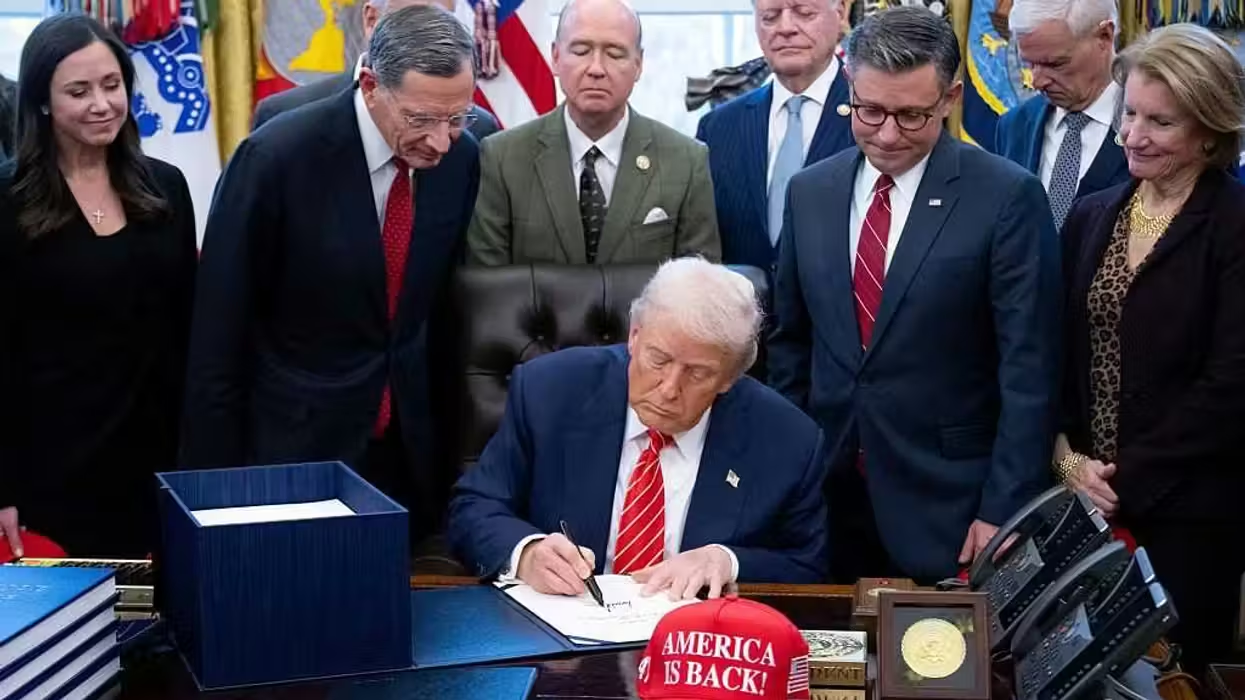
© 2026 Blaze Media LLC. All rights reserved.
Book buzz: Everything being written about former Treasury Secretary Tim Geithner's new memoir
May 13, 2014
A round-up of everything being written about former U.S. Treasury Secretary Timothy Geithner's new memoir.

In case you have not been following it, former Treasury Secretary Tim Geithner, who oversaw TARP and was heavily involved in drafting the controversial Dodd-Frank regulatory bill released his memoir this week, "Stress Test: Reflections on Financial Crises."
The book has received widespread coverage, so much so in fact that we thought it helpful to put together a guide to what the commentariat has been saying about it.
Below is a round-up of many of the biggest reviews and bombshell news stories the book has generated.
For more content like this, feel free to give Blaze Books a follow on Facebook and Twitter.
- Former Treasury Secretary Claims Obama White House Instructed Him to Mislead Americans on This Topic [TheBlaze] In a move that evokes thoughts of Benghazi:
"I remember during one Roosevelt Room prep session before I appeared on the Sunday shows, I objected when Dan Pfeiffer wanted me to say Social Security didn’t contribute to the deficit. It wasn’t a main driver of our future deficits, but it did contribute. Pfeiffer said the line was a ‘dog whistle’ to the left, a phrase I had never heard before," Geithner reveals in his new memoir, "Stress Test."
"He had to explain that the phrase was code to the Democratic base, signaling that we intended to protect Social Security," he added."
- Geithner book details turmoil with Warren [The Boston Globe] Timothy Geithner and Elizabeth Warren apparently did not get along very well. But actually the most interesting revelation of this article concerns who Timothy Geithner's father voted for in 2012:
"Geithner revealed that his father, who voted for President Obama in 2008, voted for Republican nominee Mitt Romney in 2012 — even though his son was a top Cabinet official in the Obama White House."
- Speed Read: The Juiciest Bits From Timothy Geithner's New Memoir [The Daily Beast] Perhaps the most interesting revelation is Geithner's confession of his admiration for House Speaker John Boehner:
"Throughout the book, when detailing his negotiations with House Republicans, Geithner continually emphasizes his surprising fondness for Speaker John Boehner. During the infamous "grand bargain" talks in 2011, Geithner "found the Speaker’s obvious discomfort with the far right wing of his caucus sort of appealing; it was too visceral to be entirely tactical."
"I kind of liked Boehner," he concedes, writing that he believes the speaker was truly a pragmatic conservative 'surrounded by extremists.'"
- ‘Stress Test’, by Timothy Geithner: In ‘Stress Test’, the former Treasury secretary combines self-deprecation and self-defence [Financial Times] A standard review, the following couple of nuggets of which are insightful:
"too much of this otherwise self-deprecating memoir is self-defence.
Geithner is at pains to emphasise he spent almost his entire career as a public servant – and none of it on Wall Street...
Yet Geithner’s protestations are undercut by his new job as president of Warburg Pincus, the private equity firm. He is stung by the charge that he served Wall Street at the expense of Main Street. Yet he admits, "I wish we had expanded our housing programs earlier, to relieve more pain for homeowners."
Ultimately, Geithner will be judged by how the system handles the next big crisis. It was he, after all, who drafted the Wall Street reform bill that became Dodd-Frank. Geithner does not sound very optimistic. "Markets will find ways around risk-taking constraints," he writes, 'the way rivers flow around stones.'"
- Geithner Book Rekindles Barofsky Hatefest [National Review Online] Tim Cavanaugh writes of the feud between former U.S. Treasury Department Inspector General Neil Barofsky and Tim Geithner; Barofsky wrote a stinging rebuke to what Geithner revealed about Barofsky in "Stress Test":
"But the meat of Barofsky’s complaint is a conceptual attack on the $700 billion TARP itself:
Mr. Geithner also apparently calls me a number of names and claims that I lacked the necessary financial knowledge or experience for the job. I take great pride in the professional and skilled team that we assembled and the detailed and widely respected reports detailing the bailout that we issued. Indeed, they have widely been heralded as the most complete record of the government’s efforts. Mr. Geithner also ignores the facts when he suggests that we failed to report on the returns on TARP’s investments and that we criticized him without suggesting alternatives. In fact, we issued reports every single quarter that detailed how much money came back to Treasury and that included dozens of recommendations to improve the programs.
Mr. Geithner apparently concludes that our relatively unknown agency was “damaging” to his efforts to persuade the American people to support his program. While I take it as a compliment that he thinks that our team had such a disproportionate impact, I suspect that the truth is slightly different. The American people considered TARP an unfair giveaway to the largest banks and a failure for Main Street because, in fact, that is exactly what it was.
I would trust Barofsky over Geithner any day — though he is theoretically on the "left" of the economic dream team...
Barofsky (who became SIGTARP shortly before Obama’s inauguration and left in 2011) was notably if not uniquely honest in the Obama brain trust. He correctly pointed out in 2010 that the design of federal housing efforts was to re-inflate the housing bubble — not exactly a Newtonian discovery, but something few people in government were willing to say outright. He consistently threw water on bogus claims that the TARP was on the verge of turning a profit...he was unusually willing to admit [pdf] that the whole federal apparatus of trial loan modifications was a form of cruelty, dragging out the pain and false hope for people who would have been better off just getting foreclosed and moving on with their lives. He made an earnest effort to perform an essentially impossible task: safeguarding the taxpayers’ interest in a program that was designed to rip off the taxpayers.
...Barofsky’s commitment to getting at the truth is in fact the source of the hatred between the two men."
- 10 Parts of Tim Geithner’s Stress Test That Won’t Give You Financial Crisis PTSD [New York Magazine] A roundup of all the soft stuff in "Stress Test," including among other things that Geithner took a tweet about him being the "honey badger" of the administration as a sign he had been in Washington too long. Also, this [emphasis from New York Magazine]:
Geithner and economist Larry Summers have a complicated relationship — more mentor/protegé than frenemy, but with hints of animosity. Witness this near-perfect neg, lobbed at Geithner by Summers early in his career: "Larry once said he could envision me as the managing partner of a law firm, or running some big institution, if only my credentials weren’t so thin. 'I just don’t know how you’d get hired in the first place,' he said."
- A Memoir From the Eye of a Financial Storm [New York Times] In which the Times carries water for the financial interventions that Mr. Geithner helped direct, primarily arguing that his primary failure was one of messaging:
"Stress Test" provides an intimate take on the financial crisis, and in this respect stands as a gripping, if subjective bookend to already published accounts, like the journalist David Wessel’s riveting chronicle "In Fed We Trust" and the economist Alan S. Blinder’s lucid "After the Music Stopped." "Stress Test" conveys in visceral terms just how precarious things were during the crisis, just how frightened many first responders were, and just what an achievement it was to avert a major depression.
"Stress Test” does not provide any big new revelations, nor does it shed new light on the inside workings of the Obama White House. The book attempts, rather, to explain why Mr. Geithner and his colleagues made the choices they did — something Mr. Geithner acknowledges he “never found an effective way” of doing at the time (in much the same way that many say the Obama administration failed to communicate the goals and benefits of health care reform). Mr. Geithner suggests that the administration’s failure to make a strong case for its economic plan in real time meant "we lost the country" while trying to steady the financial ship."
- What Timothy Geithner Really Thinks [New York Times Magazine] A long and seemingly candid profile of Geithner from Andrew Ross Sorkin, that ends with this:
"I asked if the job [Geithner's new role as president of the private equity firm Warburg Pincus] meant that he had finally given up socialism, which his more severe detractors had accused him of, and embraced capitalism.
"No," he said, with a laugh. "I wouldn’t claim that yet.'"
- What We Learned from Tim Geithner's Book [The Upshot/New York Times] In which it is revealed that among other things, the Obama administration did not have a plan of action when they rolled out how they planned to handle the financial crisis, via Tim Geithner's first speech:
"Mr. Geithner’s first major speech, in February 2009, was billed as the rollout of the Obama administration’s plan to end the financial crisis. It was a debacle on every level, and from Mr. Geithner’s account it seems he and his staff could see it coming like a slow-motion car crash. After settling on Feb. 10 to roll out the administration’s plan, the Geithner aide Meg McConnell noted, "But we don’t have a plan." Indeed. “The run-up to my speech was horribly tense,” Mr. Geithner writes. "White House staff wanted the speech to reassure the public by emphasizing our determination to get tough on Wall Street and save taxpayer dollars. My Treasury team wanted to reassure the markets by emphasizing our determination to do whatever it took to prevent more bank failures. The results were predictably schizophrenic."
...No wonder the stock market fell 500 points that day and speculation ran rampant that Mr. Geithner would be the first Obama cabinet member to be fired."
- Mitt Romney adviser: Tim Geithner's lying [Politico] In which top Romney economic adviser, Professor Glenn Hubbard calls Tim Geithner's claim a lie that Hubbard admitted in a conversation that "of course we have to raise taxes...We just can't say that now," in context of a deficit reduction plan. Per the article:
"On Sunday [May 11th], Hubbard said of the alleged conversation: "Geithner is making it up."
"It’s pretty simple. It’s not true," Hubbard said when reached by phone.
Hubbard, who said Geithner did not reach out to him before the publication of the book, said he remembers having a conversation about the Simpson-Bowles plan.
"I was asking him something like, how can Romney’s plan be off base because it’s essentially the Bowles-Simpson structure and Bowles-Simpson actually raises revenue," Hubbard said. 'But I wasn’t suggesting that we’re trying to raise taxes.'"
- Book Review: 'Stress Test' by Timothy Geithner [Wall Street Journal] Perhaps the most damning aspect of the Journal's James Freeman's review is below:
"Regardless of the story Mr. Geithner is telling now, there remains the question of why exactly America couldn't survive without a firm like Bear Stearns, which held no taxpayer-insured deposits. Mr. Geithner tells the story of Warren Buffett approaching him at a conference shortly after the rescue to offer congratulations. "I was sort of hoping you wouldn't do it, because then everything would have crashed and I would have been first in line to buy," said Mr. Buffett, according to the book. "It would have been terrible for the country, but I would've made a lot more money." A scenario in which Mr. Buffett is snapping up bargains doesn't sound like Armageddon.
One of the themes in "Stress Test" is Mr. Geithner's difficulty in understanding the health of large financial firms. He admits that he didn't see the mortgage crisis coming and didn't grasp the severity of the problems after it appeared. He didn't require that the banks he was overseeing raise more capital because his staff's analysis couldn't foresee a downturn as bad as the one that occurred.
None of this is particularly surprising in a man who, at the time he became president of the New York Fed, had never worked in finance or in any type of business—unless one counts a short stint in Henry Kissinger's consulting shop."
Want to leave a tip?
We answer to you. Help keep our content free of advertisers and big tech censorship by leaving a tip today.
Want to join the conversation?
Already a subscriber?
Ben Weingarten is a writer, commentator, and editor at large at RealClearInvestigations. He is a senior contributor at the Federalist and writes columns for Newsweek and the Epoch Times.
Ben Weingarten
Ben Weingarten is a writer, commentator, and editor at large at RealClearInvestigations. He is a senior contributor at the Federalist and writes columns for Newsweek and the Epoch Times.
more stories
Sign up for the Blaze newsletter
By signing up, you agree to our Privacy Policy and Terms of Use, and agree to receive content that may sometimes include advertisements. You may opt out at any time.
Related Content
© 2026 Blaze Media LLC. All rights reserved.
Get the stories that matter most delivered directly to your inbox.
By signing up, you agree to our Privacy Policy and Terms of Use, and agree to receive content that may sometimes include advertisements. You may opt out at any time.






